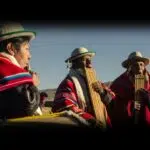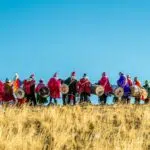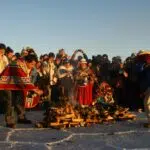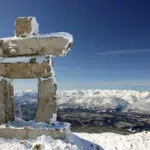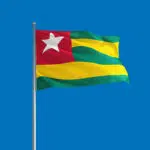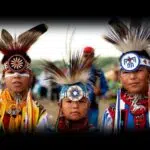National Day of the Indigenous People is celebrated any day between June 20 to June 24 in Chile and this year it will be commemorated on June 21. The day honors the rituals and beliefs of the indigenous communities. The celebration also coincides with the winter solstice, which recognizes the beginning of a new year as per the indigenous worldview. Chileans enjoy a public holiday on the day and mark the day with educational seminars, gatherings, and demonstrations that honor and pay respects to the indigenous peoples of Chile.
History of National Day of the Indigenous People in Chile
Chile’s vibrant and flourishing democracy is a shining example of the remarkable progress made in the last century. The country inhabits more than two million indigenous peoples, who make up almost 13% of Chile’s population. Chile is home to 10 prominent indigenous tribes, namely Aymara, Atacameño, Quechua, Colla, Changos, Diaguita, Rapanui, Kawésqar, Yagán, and Mapuche. Before the Spanish colonization, the country’s tribes lived in harmony and shared livelihood and resources. Upon the sixteenth-century Spanish conquest, the indigenous peoples began scattering across the land for survival.
National Day of Indigenous People recognizes the history of indigenous peoples. The day also celebrates Chile’s varied population’s richness and cultural diversity. In 1998, President Eduardo Frei Ruiz-Tagle issued a Supreme Decree announcing it. According to the indigenous worldview, the day falls on the winter solstice, which ushers in a new year. The public holiday unites Chileans across different backgrounds who come forward to honor the beauty and depth of indigenous beliefs and cultures. The National Corporation for Indigenous Development and Indigenous Communities organizes seminars, inaugurations, educative events, and parades to bring attention to the unique customs of the indigenous people.
Chileans take the day to reflect on the rich history of the country and the shared geographical destiny of Native Americans and European migrators. Because the social capital of the settled colonies outweighs the indigenous tribes, it is incumbent upon the former to extend the grace of recognition and assimilation to the latter. The indigenous people also participate in public programs and share their ancestral prowess and cultural wealth with their fellow citizens.
National Day of the Indigenous People in Chile timeline
Chile gains independence from Spain.
The Mapuche Tribe loses 23 million acres of land to the Chilean government.
Chile’s government recognizes indigenous sovereignty and announces a day of celebration in its honor.
The legislative bodies of Chile agree in unison to declare the National Day of Indigenous People as a public holiday.
National Day of the Indigenous People in Chile FAQs
Which Chilean indigenous group descended from the Incas?
The Collas are the offspring of a pre-Incan Aymara civilization that predominately inhabit the Atacama region.
Who were the first inhabitants of Chile?
Around 10,000 years ago, Native Americans built camps and began to live in Chile.
Where do the indigenous peoples live in Chile?
Most indigenous peoples live in urban areas of the country, and a concentration of tribes can be found in Los Lagos and Araucanía regions.
How to Observe National Day of the Indigenous People in Chile
Honor the indigenous communities
Open your homes and your hearts. Share a meal with indigenous communities to make them feel accepted by you.
Observe the new year tradition
The indigenous tribes mark the new year by letting go of the material and emotional baggage of the present to step into a future of abundance. Follow their lead and donate a few of your items to charity.
Visit Chile
Plan a vacation to the exotic lands of Chile. The irresistible salt air, beautiful beaches, and spectacular tourist places make for an epic holiday in this stunning country.
5 Interesting Facts About National Day Of The Indigenous People In Chile
The shocking poverty rate
One-third of all indigenous peoples in Chile live in poverty.
They aren’t part of the constitution
Chile is the only Latin American country that doesn’t include or acknowledge indigenous people in its constitution.
The leader of the tribes
The Mapuche tribe is the most politically active group among the 10 tribes.
There’s a law recognizing their rights
Chile’s government has recognized the rights and sovereignty of the indigenous peoples through Convention 169.
A small step forward
Chile’s government recently invested $24 billion across the indigenous settlements to boost productivity and infrastructure.
Why National Day of the Indigenous People in Chile is Important
It honors the indigenous communities
There is no better way to honor the indigenous communities than to respect their beliefs and assimilate their culture into the masses. This day acknowledges the equal rights shared by the people and the duty to respect the culture of every Chilean.
It brings the Chilean people together
National Day of Indigenous People is a public holiday in Chile and the perfect time to brush off some dust from history books. Chileans come together to read about the history of Chile’s colonization and the impact of the invasion on the Native American tribes.
It is a reminder of the cycle of life
National Day of Indigenous People coincides with a substantial day for indigenous tribes, i.e., a new year. The day recognizes the beauty of new beginnings and the transient nature of life.
National Day of the Indigenous People in Chile dates
| Year | Date | Day |
|---|---|---|
| 2024 | June 21 | Friday |
| 2025 | June 20 | Friday |
| 2026 | June 21 | Sunday |











